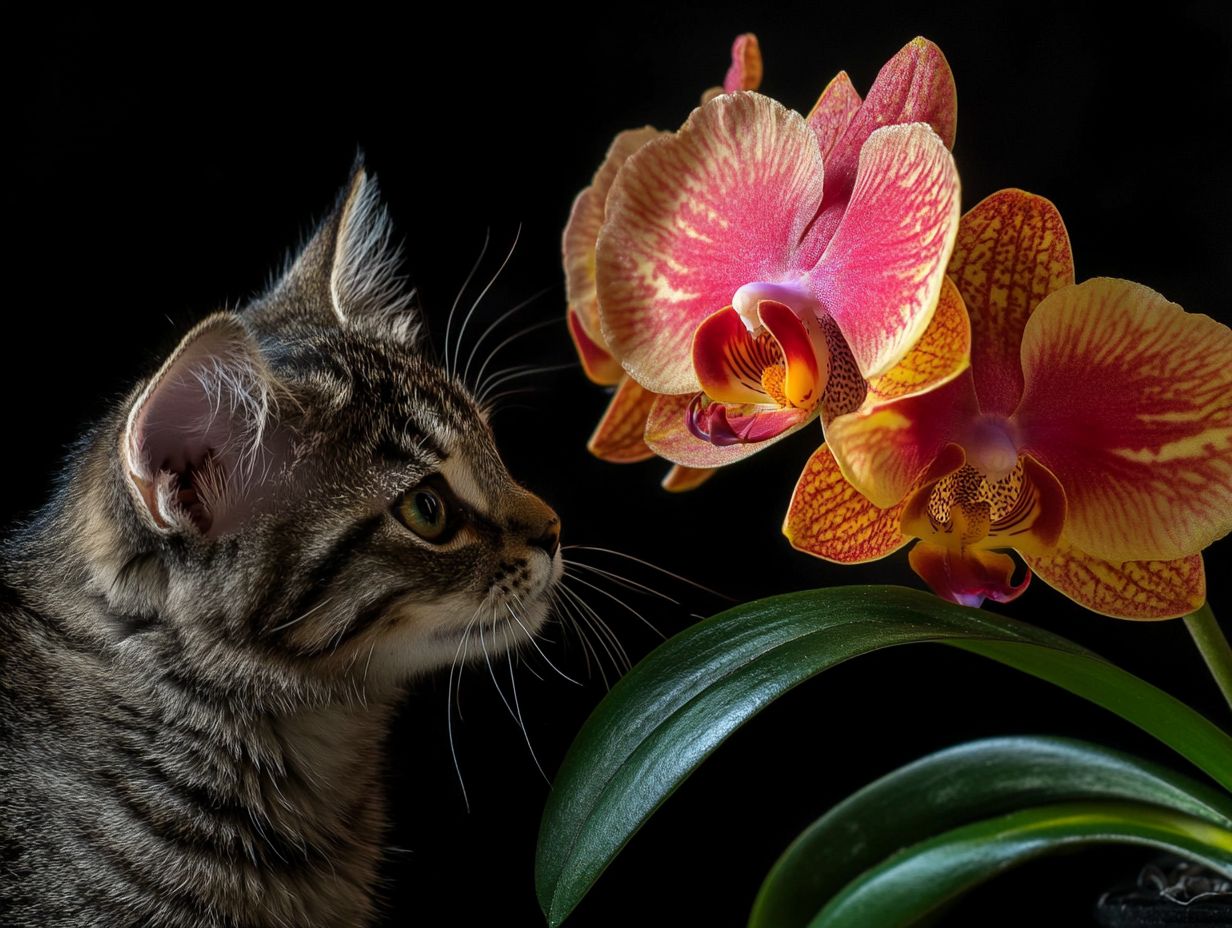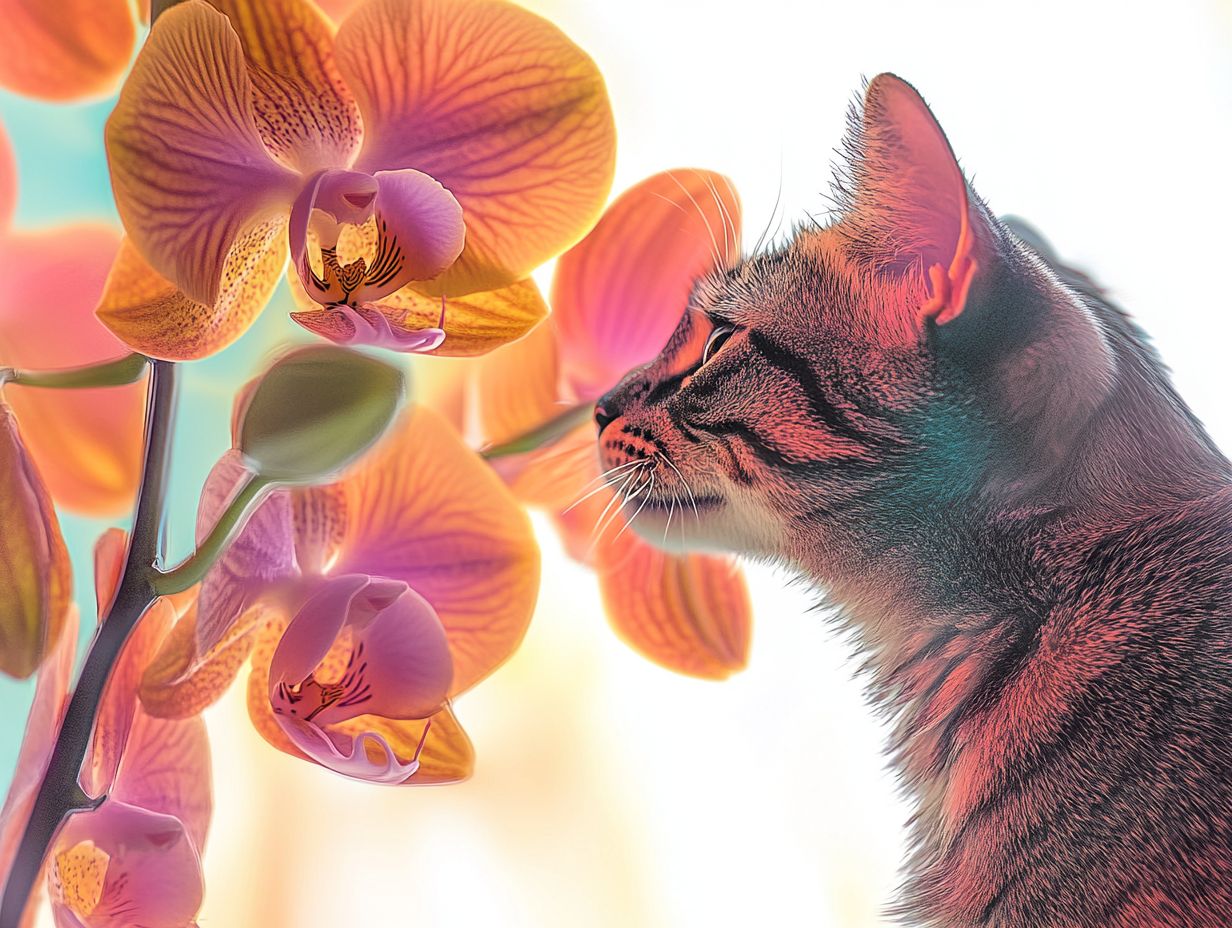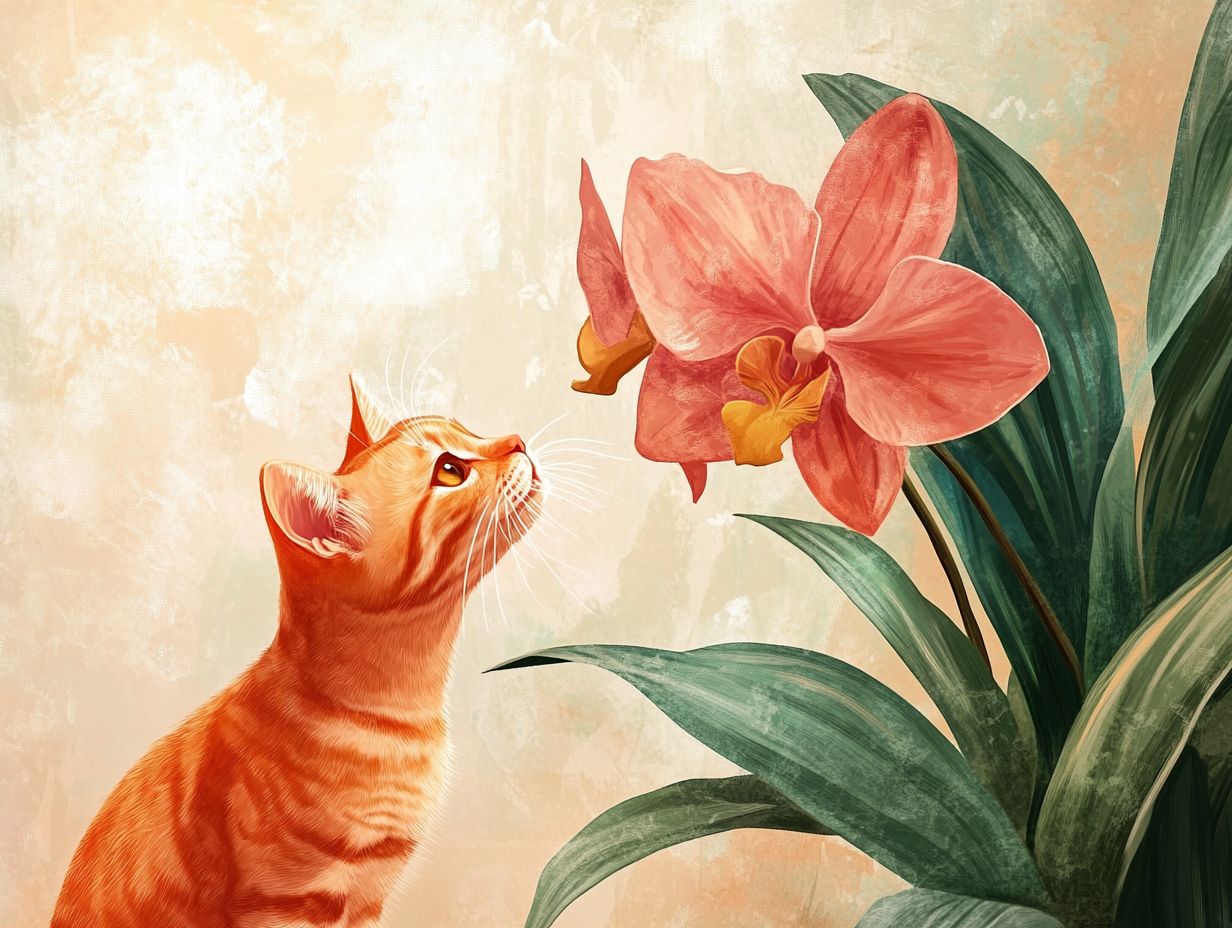If you’re a cat owner with a passion for orchids, you might be wondering about the safety of these beautiful plants and exploring pet-safe, non-toxic solutions for your home.
Are they harmful to your feline friend? This article explores whether orchids are toxic to cats, which parts may pose a risk, and what symptoms to watch for if your cat ingests one. It’s crucial to understand the behaviors and risks associated with these houseplants.
We also share essential tips on keeping your kitty safe around orchids and what to do in case of accidental ingestion, including advice from experts like Yvonne Villasenor and Renee Schmid.
Read on to ensure a harmonious home for both your plants and your pet!
Key Takeaways:

Toxicity of Orchids: Are They Poisonous to Cats?
Cats are naturally curious animals and often explore their surroundings, which raises concerns among pet owners about the safety of houseplants like orchids.
While many orchid species, such as Phalaenopsis and Cattleya, are considered non-toxic and safe for pets, it is essential for cat owners to research and ensure that the plants they introduce into their homes do not pose a risk to their pets’ health.
Familiarity with specific orchid species, such as Epidendrum and Oncidium, can help in making informed decisions about pet-safe houseplant options.
What Parts of the Orchid are Poisonous?
Generally, orchids are considered non-toxic; however, certain species may cause mild gastrointestinal upset if specific parts are consumed. It is essential for pet owners to identify which parts may pose a risk.
While most orchids are non-toxic to cats, pet owners should be aware that certain species can still pose a risk if specific parts are consumed, potentially leading to adverse health effects. For instance, although Cattleya and Phalaenopsis varieties are generally considered safe for cats, their leaves and flowers can cause gastrointestinal upset if ingested in large amounts.
It is essential to monitor cat interactions with these plants to prevent excessive consumption by curious pets. Symptoms of gastrointestinal upset typically include vomiting or diarrhea, which can usually be addressed with veterinary care.
Understanding which parts of orchids are safe (the blooms) and which are less safe (the leaves) is crucial for ensuring the well-being of your cat.
What Happens if a Cat Ingests an Orchid?
Symptoms of orchid poisoning in cats include gastrointestinal upset, such as vomiting or diarrhea, which should be closely monitored by pet owners. Other potential reactions to orchid ingestion, such as lethargy or loss of appetite, should also be diligently observed.
The long-term effects that certain orchids may have on cats are just as concerning as the immediate symptoms. To protect cats from orchid poisoning, guardians should be aware of their pet’s normal behaviors and watch for any changes.
If symptoms are noticeable and do not improve, seeking veterinary care promptly can make a significant difference in the recovery period. Knowing the specific type of orchid involved may assist the veterinarian in making a more accurate assessment of the cat’s condition and prognosis.
What Are the Symptoms of Orchid Poisoning in Cats?
Symptoms of orchid poisoning in cats can vary, but common signs include:
- Vomiting
- Diarrhea
- Lethargy
- Drooling
- Loss of appetite
- Pacing
- Abdominal pain
Affected cats may also become more vocal as they feel increasingly uncomfortable. The sooner these symptoms are recognized, the better, as ignoring them could lead to more severe health issues.
If you suspect that your cat has ingested orchids, it is crucial to take them to a veterinarian’s office immediately. A trained professional can then provide supportive treatment options, such as fluid therapy and medication, to alleviate these symptoms and aid in their recovery.
How to Keep Your Cat Safe Around Orchids

First Aid and Treatment
If your cat ingests an orchid, follow these steps:
- Remove the orchid from your cat’s reach immediately.
- Observe your cat for any symptoms of distress or illness.
- Contact your veterinarian as soon as possible for further guidance.
- If advised, take your cat for an examination.
Prompt action can significantly impact your cat’s health and recovery.
Prevention and Safety Measures
To keep your orchids and cats safe:
- Place orchids in high or enclosed locations that are out of reach of your cat.
- Choose non-toxic plant alternatives, such as spider plants or Boston ferns.
- Use deterrents or sprays that discourage cats from approaching houseplants.
Common Misconceptions about Orchids and Cats
Some people believe that all houseplants are toxic to cats, but this is not true. While certain plants can indeed harm pets, many orchids are safe. It is essential to cross-reference reliable sources when determining plant safety.
Citation
For more detailed information on plant toxicity, consult veterinary journals or databases like the ASPCA’s Animal Poison Control or the Merck Veterinary Manual.
Disclaimer: Always consult with your veterinarian for personalized advice. The information provided here is not a substitute for professional veterinary care.
Ensuring the safety of cats around orchids is essential for any pet owner, as a cat’s natural curiosity can lead to the unintentional ingestion of potentially harmful plants. According to the ASPCA Animal Poison Control, most orchids are considered non-toxic to cats, but it is important to be cautious. For more information, check out Are Orchids Poisonous to Cats? Key Facts for Cat Owners.
To create a safe environment for both your cat and your houseplants, several important strategies should be implemented. These include:
- Selecting pet-safe, non-toxic orchid varieties
- Taking preventive measures to minimize the risk of dangerous interactions
Additionally, closely monitoring your cat’s behavior around these plants is crucial for their safety and overall well-being.
1. Keep Orchids Out of Reach
The simplest way to keep a cat safe from orchids is to place the orchids in locations that are out of the cat’s reach, thereby reducing the likelihood that a cat’s natural curiosity will lead to knocking over or eating the plant. Consider using cat grass as a distraction and to achieve this, utilize vertical space effectively.
Positioning orchids on high shelves or using wall-mounted plant hangers can be quite effective. Bookcases or tall furniture serve as excellent homes for orchids, providing both safety and aesthetic appeal. Consider using pet gates or netting around delicate plants as additional barriers.
These measures effectively combine aesthetics with safety, beautifying the home while protecting the curious cat.
2. Choose Non-Toxic Varieties of Orchids
The best orchids for cats are non-toxic varieties, such as the Phalaenopsis orchid and the Cattleya orchid. Selecting non-toxic orchids is essential for reducing the health risks associated with having indoor plants in homes with pets. According to the American Association of Equine Practitioners, these varieties are generally safe.
Along with Phalaenopsis and Cattleya orchids, the Dendrobium and Oncidium orchids are also excellent choices. These species not only enhance the beauty of any space but also ensure the safety of your pets, as they are generally considered non-toxic.
Caring for these orchids involves providing adequate light, proper watering, humidity, and pest control. Utilizing organic fertilizers and avoiding chemical pesticides will help maintain a healthy environment. By choosing these non-toxic options, plant lovers can enjoy their gardening while creating a safe environment for their furry companions.
3. Use Deterrents to Keep Cats Away from Orchids
Deterrents are among the most effective ways to keep cats away from orchids, thereby reducing the risk of ingestion and ensuring a safe environment for both pets and plants. Various methods can be employed, including pet-safe sprays that utilize scents unpleasant to cats, as well as physical barriers constructed around delicate flowers. Alternatives like cat grass and Boston fern provide safe options for curious cats.
Both options are relatively unobtrusive and functional. Scent-based deterrents typically feature ingredients like citrus or bitter apple, which most cats instinctively dislike, thus safeguarding the health of both plants and animals.
Creating a welcoming environment for pets complements these strategies; ensuring that the deterrents are safe and non-toxic allows cats to coexist peacefully with beautiful plants, enhancing the tranquility of your home.
What to Do If Your Cat Ingests an Orchid
Prompt evaluation and treatment following exposure to any plant material are crucial for assessing a pet’s health and minimizing any potential risks associated with the ingestion of plants, even those deemed non-toxic. Below are steps you should take:
1. Monitor Your Cat’s Symptoms

It is crucial to monitor your cat for symptoms after it eats an orchid. Symptoms can be categorized as follows:
- Mild: Nausea, drooling, slight vomiting.
- Moderate: Repeated vomiting, diarrhea, lethargy.
- Severe: Difficulty breathing, persistent vomiting, seizures.
Additionally, be vigilant for other symptoms such as loss of appetite or any behavioral changes. Owners should observe their pets closely for at least 24 to 48 hours to identify any reactions. For more information, check out Are Orchids Poisonous to Cats? Key Facts for Cat Owners.
First Aid Instructions
If you suspect your cat has ingested an orchid, follow these steps:
- Remove the Source: Safely remove any remaining plant material from your cat’s vicinity.
- Contact Your Veterinarian: Call your vet immediately for guidance.
- Monitor Symptoms: Keep track of any symptoms as they develop.
- Follow Veterinary Advice: Adhere to any treatments recommended by your vet.
Important: Never induce vomiting without veterinary guidance.
Common Misconceptions
Many pet owners believe all orchids are harmful to cats. However, most orchids are classified as non-toxic by veterinary sources, including the ASPCA. Understanding the differences can help pet owners make informed decisions.
Final Thoughts
Having orchids in a cat-friendly home can pose both risks and benefits. While non-toxic varieties are generally safe, it’s essential to be aware of potential minor issues like gastrointestinal upset and the curiosity of your pets. Special considerations should also be taken for different categories of cats (kittens, seniors, or those with health conditions).
For further guidance, please reach out to the ASPCA Animal Poison Control for proactive safety measures.
Note: Content will be reviewed and updated regularly to reflect the latest research. This article does not provide medical advice; consult your veterinarian for personalized guidance.
Keeping a careful record of these symptoms, including their timing and severity, can significantly aid medical professionals in determining the appropriate treatment. Documenting any changes and communicating them clearly will enhance the chances of a swift and accurate response.
2. Contact Your Veterinarian
If you suspect that your cat has eaten an orchid, you should contact your veterinarian as soon as possible. Seeking professional advice tailored to your cat’s medical situation is crucial. Consider consulting resources such as the American Society for the Prevention of Cruelty to Animals (ASPCA) or the Pet Poison Helpline for further guidance.
Providing the vet with detailed information about the orchid species, the quantity consumed, and any symptoms you have observed will help ensure your cat receives the appropriate diagnosis and treatment. Different orchid varieties can have varying levels of toxicity, so identifying the species is important.
Known Safe vs. Potentially Harmful Orchid Varieties
- Safe Varieties: Phalaenopsis, Cattleya, Epidendrum, Oncidium
- Potentially Harmful Varieties: Dendrobium (may cause mild gastrointestinal upset)
The amount ingested may influence the severity of side effects, and your observations—such as whether your cat is vomiting, experiencing diarrhea, or lethargic—can assist the vet in determining the next steps. Being prepared with this information will facilitate the consultation and enhance your cat’s health care.
3. Seek Emergency Care if Necessary
If your cat has consumed an orchid and is exhibiting severe symptoms, it is crucial to seek emergency veterinary care immediately to prevent potential death and suffering. Cats may display a range of concerning symptoms, including severe vomiting, extreme lethargy, significant difficulty breathing, and gastrointestinal upset.
These symptoms pose a high risk of serious complications if not addressed promptly. Owners should be cautious not to delay seeking veterinary assistance, as this could exacerbate the condition. Even symptoms that initially appear minor can develop into more severe issues, potentially leading to toxic reactions.
Potential Symptoms of Orchid Ingestion
- Mild: Slight stomach upset, decreased appetite
- Moderate: Vomiting, diarrhea
- Severe: Extreme lethargy, difficulty breathing, severe vomiting
If you are ever in doubt, contacting a veterinarian is the best way to ensure the health and happiness of your pet. This advice is essential for all pet owners to keep their animals pet-safe.
First Aid Steps for Suspected Orchid Ingestion
- Remove any remaining orchid material from your cat’s reach.
- Monitor your cat closely for any symptoms of distress.
- Contact your veterinarian or an emergency veterinary clinic immediately.
Learn more about ensuring a pet-friendly environment and tips from experts like Yvonne Villasenor from Daily Paws, Renee Schmid from the Pet Poison Helpline, and the ASPCA (American Society for the Prevention of Cruelty to Animals).
Frequently Asked Questions
Are Orchids Poisonous to Cats?
No, orchids are not poisonous to cats. They are considered non-toxic and pet-friendly for cats to be around. However, it’s important to recognize that some specific varieties may cause mild reactions.
Can Cats Eat Orchids?

Cats should not eat orchids, as they are not a part of their natural diet and may cause stomach upset or other gastrointestinal upset. It is best to keep orchids out of reach of curious cats to avoid any ingestion risks.
What Should I Do If My Cat Ingests Orchids?
If your cat ingests orchids, monitor them closely for any signs of illness or discomfort. If they show any symptoms, such as vomiting or diarrhea, it is important to contact your veterinarian for further advice. Prompt action is crucial to ensure their safety.
Are All Types of Orchids Safe for Cats?
While most orchids are non-toxic to cats, it is always best to check the specific species or type of orchid you have in your home. Some varieties may have different toxicity levels and could potentially harm your cat. Researching specific types like Phalaenopsis, Cattleya, Epidendrum, Oncidium, and lady slipper (Cypripedium) orchids is advised.
What are the Benefits of Orchids for Cat Owners?
Aside from being safe for cats, orchids can bring a touch of beauty and elegance to your home decor. They require minimal care and can be a great conversation starter when guests come over. Orchids are ideal houseplants for pet owners seeking pet-safe options.
How Can I Ensure My Cat’s Safety Around Orchids?
Ensure that all plants, including orchids, are placed out of your cat’s reach. Regularly inspect your home for any signs of plant chewing or ingestion. Be aware of any special considerations for kittens or senior cats, as they may have different sensitivities to various plants.
Common Myths about Orchids and Cat Safety
- Myth: All orchids are toxic to cats. Fact: Most orchids are non-toxic and safe for cats.
- Myth: If a cat eats any plant, it’s dangerous. Fact: Many household plants, including orchids, are safe.
Disclaimer: This information is not a substitute for professional veterinary advice. Always consult your veterinarian for concerns about your pet’s health.
Emergency Contacts: For urgent cases, contact the ASPCA Animal Poison Control at (888) 426-4435.
Last reviewed on: October 2023
To ensure your cat’s safety around orchids, it is best to keep away the plants in a separate room or high up where your cat cannot reach. You can also consider using deterrents, such as citrus sprays, to discourage your cat from getting too close to the orchids. This strategy is essential to prevent any choking hazards or ingestion of chemical treatments like pesticides or fertilizers used on the plants.
Are Orchids Toxic to Cats?
Orchids are generally considered non-toxic to cats, according to the ASPCA Animal Poison Control. However, ingestion of any plant material may cause minor gastrointestinal upset.
Symptoms of Toxicity
- Mild: Vomiting, diarrhea, and drooling.
- Moderate: Loss of appetite and lethargy.
- Severe: Increased heart rate and difficulty breathing.
First Aid Instructions
If you suspect your cat has ingested orchids, follow these steps:
- Remove any remaining plant material from your cat’s mouth.
- Monitor your cat for symptoms.
- Contact your veterinarian or the ASPCA Animal Poison Control at 888-426-4435 immediately.
Safe Alternatives
Consider safe plants that can be kept around cats, such as:
- Bamboo
- Spider plants
- Boston ferns
Addressing Misconceptions
A common myth is that all orchids are safe for pets. While orchids are generally non-toxic, some may cause mild digestive disturbances, so it’s wise to monitor your pets closely.
Balanced Perspective
While orchids are non-toxic, they can still cause minor issues like gastrointestinal upset if ingested. Always assess the individual needs and health status of your pets before bringing new plants into your home.
Special Considerations
Kittens, senior cats, and those with underlying health conditions may be more susceptible to the effects of any plant material. Always supervise your pets around any plants.
Visual Aids
Consider including clear, labeled images of orchids for easy identification. Infographics summarizing key points can also enhance understanding.
Expert Input
Veterinarians recommend monitoring cats around any plants, including orchids, to ensure their safety. Always consult with a veterinary professional for personalized advice.
Emergency Contact Information
For immediate assistance, contact ASPCA Animal Poison Control at 888-426-4435.
Regular Updates
It’s important to regularly review and update information as new research emerges. This content was last reviewed on [Insert Date].
Cross-Reference Topics
For more information, check out related topics on plant safety for cats.
Legal Disclaimer
This content is for informational purposes only and should not be considered medical advice. Always consult a veterinarian for specific concerns regarding your pet’s health.